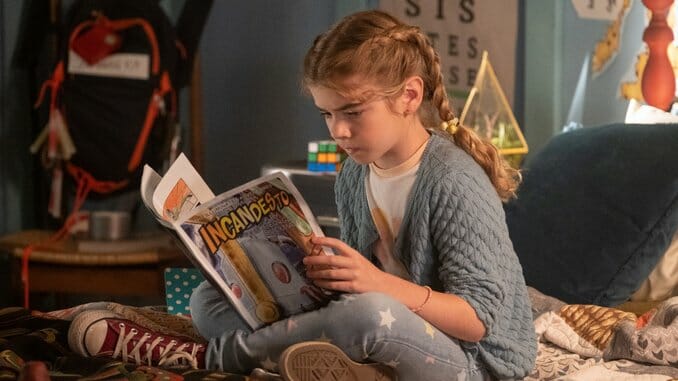Flora & Ulysses Tackles Tough Issues with Sweetness and a Super-Squirrel

In the grand scheme of “little kid meets unique animal that helps them get through real-life hardship” films, the actual powers those animals wield—be it extraordinary cuddliness or a rare ability to understand human problems—are kind of beside the point. Flora & Ulysses says that’s all well and good, but in this superhero-flooded world, kids deserve a superpowered squirrel. Thanks to director Lena Khan and some solid VFX work, Disney+’s Kate DiCamillo adaptation manages to mostly make a compelling, cute and amusing case.
Flora (Matilda Lawler, who stands in the right place and states her lines matter-of-factly without much emotion or sense of timing) is yet another precocious little kid, a self-described cynic who spouts comic-adjacent exclamations that put The Big Bang Theory crowd to shame. Disney had better hope CBS doesn’t take issue with Flora’s “Holy Bagumba!” She loves comic books and her parents, who are recently separated. Dad (Ben Schwartz) is a comic book artist, mom (Alyson Hannigan) a romance novelist. Flora resuscitates a CGI squirrel that’d been eaten by a runaway vacuum, giving Ulysses his tragic origin story. If this all sounds a bit heavy for a kids’ movie, it’s because Flora & Ulysses runs headlong into some darker tonal territory that mostly works—divorce, CPR and euthanasia are all handled with respectable straightforwardness—as long as you’re not afraid to get a little whipped around by its tone.
Flora and her new friend find themselves in a bit of a Shazam! situation, where she needs to help the rodent explore its powers while reminding us of all the tropes of comic book heroism: Especially hope that the little guy can overcome hardship. A protagonist that retreats from real world problems into superhero fantasies should be relatable to plenty of people taking part in pop culture right now, and even Lawler’s relative woodenness can’t prevent Ulysses from clicking. The squirrel FX look great: Ulysses is an expressive, fuzzy-wuzzy little guy that blends with his environment rather than clashes, even when in Flora’s hands. He’s on the cartoony side of realism and it brings a dynamic slapstick energy sorely lacking from his human costars. Not so much a mangy cat that pops up later.
Ulysses can understand and type English—the latter in amusingly sparse, poetic sentences mostly about being hungry—is super strong and has an enhanced agility that leads him to perform plenty of slo-mo backflips. It could be tacky, but the script uses Ulysses’ actual powers sparingly, which actually feels restrained and satisfying rather than overly limited. It keeps the plot scaled down and manageable, never overextending its narrative capabilities.
That narrative is mostly about Flora’s parents. Both are just. So. Sad. Hannigan imbues her depressed author, in great robey costumes surrounded by fakey vintage home décor, with charming asides and an engaging melancholy, but Schwartz feels miscast—even after existence of a super-squirrel puts hope back into his life. The latter actor has a very specific comic energy that never clicks into his schlubby sadsack, whose deadpans are so depressing as to be ridiculous. He has a few clever rambling seeming ad-libs, but his funniest moment is somewhat angrily stating a multisyllabic “Squir-rel! Squir-rel!” as chaos ensues around him in a donut shop. The pair need to know that magic still exists in the world, something altered a bit from the source material, and the actors handle this arc with an understated sweetness.
Khan and screenwriter Brad Copeland smartly inject some of the source book’s comic panel elements into the film’s montages, using it both formally and narratively to push along its emotions. “Sometimes it’s easier to draw a superhero than to act like one,” is how the film explains parents running away from, rather than dealing with, marital strife. It’s vague and hands-off—and even then it can get so sad that it threatens to derail the film—but refreshingly, it doesn’t ever talk down to its audience. Its parallels to comicky escapism are clear enough that its young audience should connect the dots, too. But it’s also here that the pace hiccups—though coming in at under 90 minutes, there’s not a lot of time for the film to drag its feet through its third act.
-

-

-

-

-

-

-

-

-

-

-

-

-

-

-

-

-

-

-

-

-

-

-

-

-

-

-

-

-

-

-

-

-

-

-

-

-

-

-

-








































